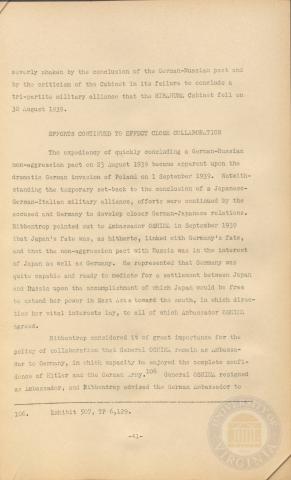
Page 41
| Parent | Japanese - German - Italian Collaboration |
|---|---|
| Date | |
| Language | English |
| Collection | Tavenner Papers & IMTFE Official Records |
| Box | Box 14 |
| Folder | Japan, Germany, Italy Collaboration and Introduction |
| Repository | University of Virginia Law Library |
severly shaken by the conclusion of the German-Russian pact and by the criticism of the Cabinet in its failure to conclude a tri-partite military alliance that the HIRANUMA Cabinet fell on 30 August 1939.
EFFORTS CONTINUED TO EFFECT CLOSE COLLABORATION
The expediency of quickly concluding a German-Russian non-aggression pact on 23 August 1939 became apparent upon the dramatic German invasion of Poland on 1 September 1939* Notwith¬standing the temporary set-back to the conclusion of a Japanese- German-Italian military alliance, efforts were continued by the accused and Germany to develop closer German-Japanese relations. Ribbentrop pointed out to Ambassador OSHIMA in September 1939 that Japan's fate was, as hitherto, linked with Germany's fate, and that the non-aggression pact with Russia was in the interest of Japan as well as Germany. He represented that Germany was quite capable and ready to mediate for a settlement between Japan and Russia upon the accomplishment of which Japan would be free to extend her power in East Asia toward the south, in which direc-tion her vital interests lay, to all of which Ambassador OSHIHA agreed.
Ribbentrop considered it of great importance for the policy of collaboration that General OSHIMA remain as Ambassa¬dor to Germany, in which capacity he enjoyed the complete confi¬dence of Hitler and the German Army. 106 General OSHIMA resigned as Ambassador, and Ribbentrop advised the German Ambassador to
106. Exhibit 507, TP 6,129.
